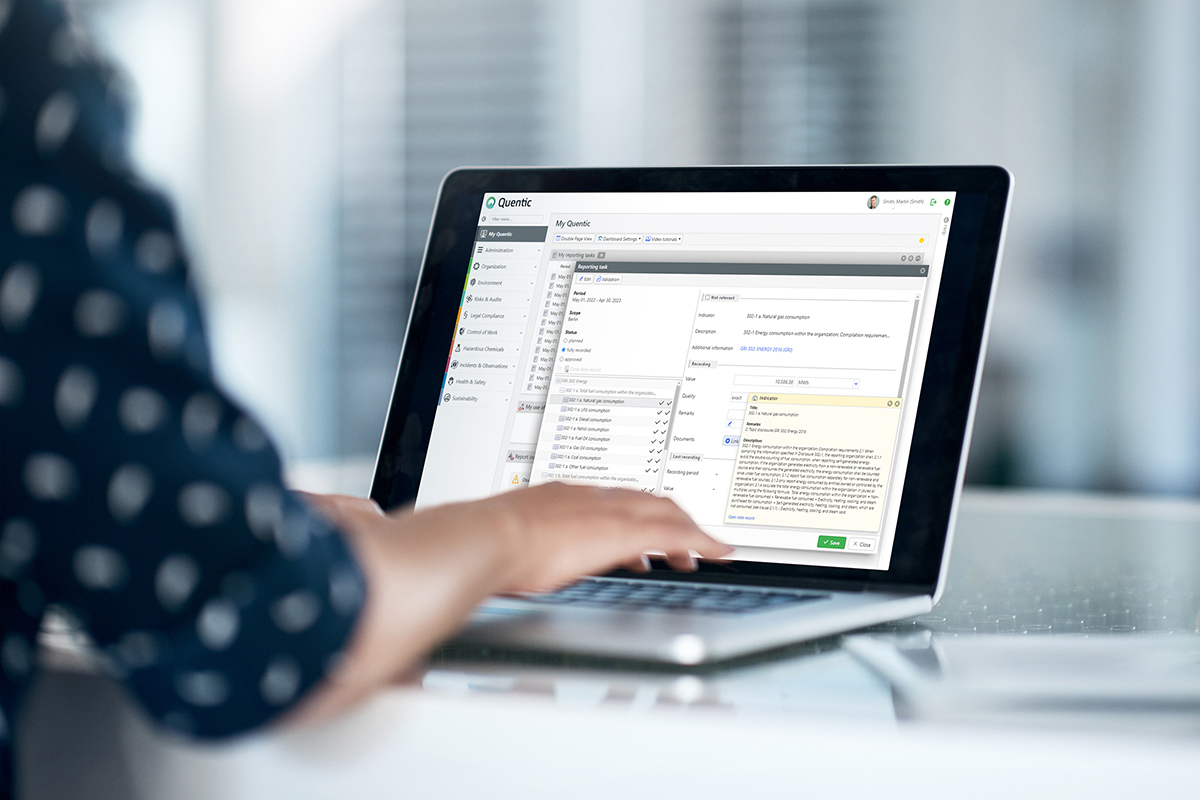The Global Reporting Initiative (GRI) has certified Quentic as a GRI Software and Tools Partner. Effective immediately, Quentic's portfolio of software and service solutions for EHSQ (Environment, Health, Safety, Quality) and ESG (Environment, Social, Governance) will include the globally recognized GRI Standards as a ready-made set of indicators for sustainability reporting. The current GRI Standards 2021 are integrated and anticipated to support companies with upcoming EU regulations such as the Corporate Sustainability Reporting Directive. This is a part of the Quentic’s 13.4 software release, which also enables risk evaluation with job profiles and the fully automated extraction of safety data sheet information.
With the release of the latest updates in Quentic 13.4, the software-as-a-service provider for occupational safety, environmental, sustainability and quality management is now certified as a GRI Software and Tools Partner. The Global Reporting Initiative (GRI) Standards are one of the most widely used guidelines in sustainability reporting worldwide. With the help of the modular GRI indicators, the impact of corporate activities on the environment, people, and the economy can be presented in a structured way. Relevant key data is identified and clarified for various stakeholders. This universal approach allows for application, regardless of industry and company size.
GRI indicators in Quentic
With the current software release Quentic 13.4, users can request the exact GRI Standards that they have identified as necessary for their company's reporting via materiality analysis. Quentic delivers the appropriate indicator data sets directly into the system, so that the entire reporting process and other areas of the cloud-based software for EHSQ and ESG management can connect seamlessly. This means that relevant sustainability data can be collected from different sources, managed uniformly, and evaluated on time without additional coordination. The latest published version of the GRI Universal Standards from 2021 is integrated, which provides reliable support for upcoming EU regulations, such as the Corporate Sustainability Reporting Directive (CSRD).
"We are proud to receive the official seal of the GRI. With this, we guarantee our customers that they can design their sustainability reporting with Quentic entirely in accordance with GRI specifications. In addition, we will further implement reporting standards in Quentic in the future and strengthen our market position in the areas of sustainability and ESG," explains Dr. Mario Lenz, Chief Product Officer of Quentic.
Evaluate risks according to job profiles
In addition to the updated GRI Standards, Quentic 13.4 includes numerous other innovations. A newly developed component in the Quentic software module Health & Safety makes it possible to overview risk potential according to job profiles. This way, the scope of activities performed by personnel can be bundled together with comparable tasks for display and evaluation. All data can be transferred into a report format with the click of a mouse and thus made transparent for external viewers – as is required by official bodies in some European countries, such as France, Italy or Spain. Hazardous substances and equipment are also included in the report, along with the qualifications required. Thereafter, safeguards and training measures can be efficiently derived to minimize existing risks.
Process safety data sheets automatically
Safety data sheets list chemical properties and indicate necessary safety precautions. Managing these documents in large numbers can quickly become an administrative burden. Those tasked with this can now look forward to a simplified solution in Quentic 13.4: SDS Extract. This will automatically read out the substance descriptions from the uploaded data safety sheets created in Quentic and turn them into new hazardous substance data records, including the general operating instructions. This can transform a loose collection of data sheets into a standardized, uniformly maintained hazardous chemical register in very little time, providing clearly structured and targeted information on demand, e.g., filtered by application area.
Quentic offers additional services for safety data sheet management, such as research and regular updating of hazardous chemical data, as a premium service.
Press pictures
With the release of the latest updates in Quentic 13.4, the software-as-a-service provider for occupational safety, environmental, sustainability and quality management is now certified as a GRI Software and Tools Partner.
- RGB | 2480 x 1653 | JPG | Quelle: Quentic - Foto: shapecharge/E+ via Getty Images
- CMYK | 2480 x 1653 | JPG | Quelle: Quentic - Foto: shapecharge/E+ via Getty Images
Dr. Mario Lenz, Chief Product Officer at Quentic
About Quentic
Quentic is one of the leading solution providers of Software as a Service (SaaS) for EHSQ and ESG management. The Quentic platform comprises ten individually combinable modules and offers an ideal way for companies to manage Health & Safety, Risks & Audits, Incidents & Observations, Hazardous Chemicals, Control of Work, Legal Compliance, Online Instructions, Processes, Environmental Management and Sustainability. The portfolio is complemented by the Quentic App for mobile reporting and by Quentic Analytics for powerful HSEQ data analysis using clear and daily updated dashboards. Over 900 companies rely on Quentic software solutions to strengthen their organization's HSEQ management and responsibility-related areas in Environment, Social and Governance (ESG). The integrative software is also suited to supporting comprehensive management systems in compliance with ISO 14001, ISO 45001 and ISO 50001.
The company is headquartered in Berlin, Germany, and employs more than 250 people. Branch offices are located in Germany, Austria, Switzerland, Finland, Sweden, Denmark, Belgium, the Netherlands, France, Spain and Italy.

